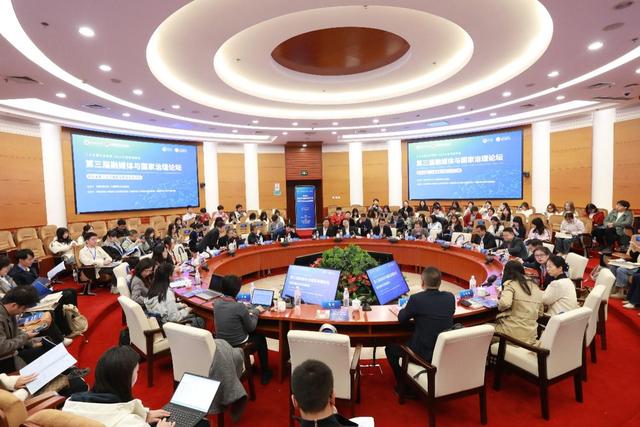On October 20, the third Forum on Integrated Media and National Governance with the theme of "Artificial Intelligence and Digital Public Governance" was held at Communication University of China.
This forum is hosted by the Communication University of China and the China Journalism and Culture Promotion Association, and hosted by the School of Government and Public Affairs of the Communication University of China, the Institute of National Governance of the Communication University of China, and the Scientific Research Office of the Communication University of China. The forum attracted many experts and scholars from the government, academia, industry and media circles to conduct in-depth exchanges and discussions on topics such as the optimization and upgrading of public services empowered by artificial intelligence and the innovative development of digital media platforms.
The opening ceremony of the forum was presided over by Pang Liang, Dean of the School of Government and Public Affairs of Communication University of China. Yang Yi, Vice President of Communication University of China, Zhang Zhouyou, President of China Association for the Promotion of Journalism and Culture, Wang Lei, Vice President of China Society of Administration, and Deputy Secretary of China Society of Administration Chairman Zhang Ding'an, Secretary of the Party Committee of the School of Government and Public Affairs of the Communication University of China Jin Yong, Dean of the School of Government and Public Affairs of the Communication University of China Pang Liang, Deputy Director of the Scientific Research Office of the Communication University of China Li Lingfei, and Dean of the Institute of National Governance of the Communication University of China Gao Huijun Others attended the forum. Yang Yi and Zhang Premiere delivered speeches respectively, emphasizing the importance of digital empowerment of public governance and calling on all walks of life to work together to promote the modernization of national governance.

During the keynote speech session, Huang Huang, a professor at Peking University School of Government, discussed the six dimensions of digital governance research; Steve Barra, an associate professor at George Washington University in the United States, shared the impact of digital public governance on transparency, participation, and responsiveness; Professor Lu Yonghong of the Chinese University of Hong Kong shared his research experience on the complexity of artificial intelligence and digital governance; Liu Chunyang, executive director of Qingbo Yuanshi Research Laboratory, demonstrated the innovative application of artificial intelligence in social media public opinion governance; grassroots guidance from the Family Services Department of the China Family Planning Association Director Huang Kuangshi discussed the connotation and path of high-quality population development in the era of artificial intelligence; Professor Liu Xutao from the National Governance Teaching and Research Department (E-Government Research Center) of the Central Party School (National School of Administration) discussed the changes and innovations in government governance in the AI era.
In the sub-forum session, participants conducted in-depth discussions on topics such as artificial intelligence empowering public policies and optimization and upgrading of public services, artificial intelligence empowering the innovative development of digital media and cultural industries, and artificial intelligence empowering social governance and risk prevention and control system construction. Communicate and share.
The holding of this forum not only provides a high-level communication platform for academia and industry, but also provides valuable intellectual support and practical guidance for the development of digital public governance in my country. With the rapid development of new generation information technologies such as artificial intelligence, digital public governance has become an important force in promoting the modernization of national governance systems and governance capabilities. (Reporter Wu Yuetong, Correspondent/Qian Juexiao, Chen Shuaiqing, Li Yuanfeng, Gao Huijun)
